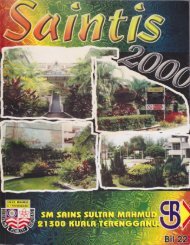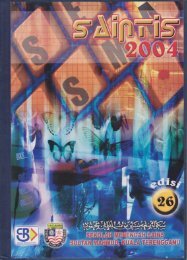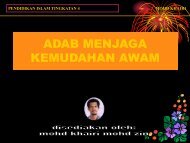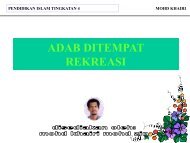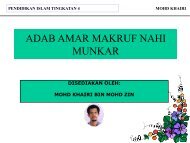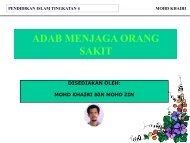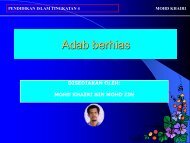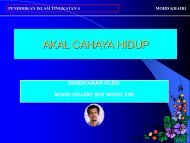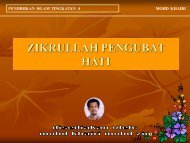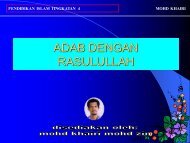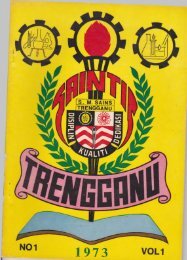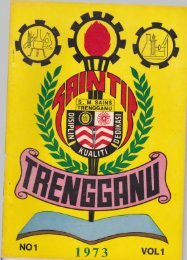library
You also want an ePaper? Increase the reach of your titles
YUMPU automatically turns print PDFs into web optimized ePapers that Google loves.
school libraries<br />
making a difference
We would like to thank all the schools involved in the creation of this brochure. In particular, we would like to acknowledge the<br />
photographer Richard Stanton, and the following schools which feature in the uncaptioned photographs:<br />
Hawarden Community Infants School, Hawarden, Flintshire<br />
Mold Alun High School, Mold<br />
St. Christophers Special School, Wrexham<br />
The Ercall Junior School,Telford<br />
Uplands Junior School, Leicester<br />
Ysgol Bodhyfryd Community Primary School, Wrexham<br />
Ysgol Llangelynnin Voluntary Controlled School, Henryd, Conwy<br />
Ysgol Clywedog,Wrexham<br />
Note: many school libraries are now known as "learning resource centres", "LRC", or "open learning centres".<br />
Similarly the school librarian may be called the ‘learning resource centre manager’.<br />
Throughout this document these terms are used interchangeably.
Foreword from Rt Hon Charles Clarke<br />
Secretary of State for Education and Skills<br />
I am delighted to be able to officially<br />
endorse this advocacy tool, which I am sure<br />
will provide school librarians with a means<br />
and an opportunity to highlight the<br />
contribution they make, through working<br />
with teaching colleagues and school leaders,<br />
to learning and teaching.<br />
The school <strong>library</strong> is the heart of a school,<br />
which itself has learning at its core and<br />
good libraries can empower the learner.The<br />
resources in a <strong>library</strong> can allow our<br />
imaginations to run free, introduce us to<br />
new experiences and promote access to<br />
knowledge and enjoyment. It is important<br />
for pupils to become independent users of<br />
information, but for this to occur it is vital<br />
that they are given the skills to learn how<br />
to find this information, how to select what<br />
is relevant, and how to use it in the best<br />
way for their own particular needs, and take<br />
responsibility for their own learning.<br />
School libraries can also help teachers to<br />
use a broader range of teaching strategies.<br />
Project work, individual study, group<br />
research, reading and the teaching of ICT,<br />
amongst other things, can all take place<br />
within the school <strong>library</strong>, and in providing<br />
this flexible place for learning, teachers<br />
themselves are encouraged to widen and<br />
enrich their own teaching strategies. By<br />
supporting and giving access to a broad<br />
range of information sources the school<br />
<strong>library</strong> can motivate pupils and stimulate<br />
learning by providing the means to freely<br />
pursue subjects which fully engage them.<br />
To do these things a school librarian must<br />
strive to improve the standards of the<br />
school <strong>library</strong> and the status of the<br />
librarian's post in the school.This<br />
publication will help give you the means and<br />
confidence to do this, and I wish you well in<br />
this endeavour.
information literacy<br />
TEACHING AND LEARNING<br />
reading<br />
out of hours<br />
SCHOOLS LIBRARY<br />
SERVICE<br />
school libraries<br />
making a difference<br />
school<br />
development<br />
the librarian<br />
as reading<br />
champion and<br />
information<br />
broker<br />
2<br />
partnership<br />
ict<br />
THE CURRICULUM
THE LIBRARY - THE HEART OF THE SCHOOL<br />
Thornton House School<br />
Worcestershire<br />
Thornton House is a school for children with<br />
moderate learning difficulties as well as those with<br />
autism. A major re-development of the whole<br />
building, along with winning a local competition for<br />
a school <strong>library</strong> makeover, resulted in the<br />
establishment of a <strong>library</strong> at the heart of the<br />
school.<br />
All staff carefully considered key issues:<br />
•<br />
How could the <strong>library</strong> encourage children to<br />
take an interest in books, given that all the<br />
school’s pupils find reading a challenge?<br />
•<br />
How could a range of multi-sensory<br />
approaches and resources be introduced and<br />
utilised?<br />
•<br />
How could links to the wider community be<br />
developed?<br />
•<br />
How could we make the <strong>library</strong> inviting and<br />
stimulating, and at the same time relaxing and<br />
reassuring?<br />
•<br />
How could space be best used bearing in<br />
mind the need for flexibility?<br />
The result is a wonderful area, which opens out<br />
into a courtyard of beauty and sensory stimulation.<br />
The pupils loved it: “We’re very lucky”; “Let’s play<br />
libraries”. Future plans include solar projectors to<br />
transport us to other worlds and into well-known<br />
and new stories. This is just the beginning.<br />
Falconer’s Hill School<br />
Northamptonshire<br />
Our <strong>library</strong> is in a corridor, due to restrictions on<br />
space and it acts like a channel that runs through<br />
every aspect of school life.<br />
The <strong>library</strong> is right next to the main entrance. It’s<br />
the first thing you see as you enter the school. It’s<br />
bright, attractive and always busy. It’s the first place<br />
I take prospective parents and it never ceases to<br />
impress them or me! How can you fail to be<br />
captivated by the sheer excitement of children<br />
selecting books they enjoy?<br />
The children (from age four to seven) come from<br />
all corners of the school, unaccompanied, to select<br />
their books which are stored in purpose built<br />
trollies. Our non-fiction material is on shelving<br />
designed by the children, with infant friendly<br />
picture labels to guide them to the subjects they<br />
seek.<br />
Parents are welcome to choose books with<br />
children. A popular time is during ‘Good Morning’<br />
activities when we invite parents/carers and preschoolers<br />
to share activities for 15 minutes at the<br />
beginning of each day.<br />
The school <strong>library</strong> offers learning services,<br />
books and resources that enable all members<br />
of the school community to become critical<br />
thinkers and effective users of information in<br />
all formats and media. School libraries link to<br />
the wider <strong>library</strong> and information network in<br />
accord with the principles in the UNESCO<br />
School Library Manifesto.<br />
“My vision of learning for children and young people<br />
in the future, has the <strong>library</strong>, in all its forms, at its<br />
heart.”<br />
Professor Tim Brighouse<br />
Saltley School Birmingham<br />
Every breaktime and lunchtime the Learning<br />
Resource Centre (LRC) is a whirlwind of activity.<br />
Long queues stretch down the corridor, pupils wait<br />
in anticipation to get in!<br />
Once in, the buzz is incredible, “Miss, can you help<br />
me find a good book?”…”Miss, can you help me<br />
find information on?”…”Miss, can I use a<br />
computer?”…<br />
Pupils see the LRC as the heart of their school, a<br />
warm friendly welcoming place with a myriad of<br />
information at their fingertips, masses of new<br />
fiction and a chance to escape into an imaginary<br />
world for just 10 minutes or an hour.<br />
3
libraries, learning and the curriculum<br />
Top Ten Steps to Success:<br />
•<br />
•<br />
•<br />
•<br />
•<br />
• Fiction to support curriculum topics<br />
• Identified and bookmarked websites<br />
•<br />
•<br />
•<br />
Range of stock to reflect the whole curriculum<br />
Collaborative planning between teaching staff and the librarian<br />
Use of the <strong>library</strong> included in curriculum planning and schemes of work<br />
Collections of resources for topic teaching<br />
Texts to support literacy across the curriculum<br />
Celebrating success - displaying pupils’ work<br />
Links to outside agencies - especially the Schools Library Service<br />
Regular current awareness bulletins for teaching staff – detailing how the<br />
school librarian’s resources and skills can support new curriculum<br />
initiatives<br />
4<br />
“It has been demonstrated that, when teachers and librarians<br />
work together, students achieve higher levels of literacy,<br />
reading, learning, problem solving and information and<br />
communication technology skills”<br />
UNESCO/IFLA School Library Manifesto 2000<br />
making teaching more effective and efficient
LIBRARies go live - libraries and I.C.T.<br />
A school <strong>library</strong> enables students to use technology in practical ways, for real research.<br />
Schools and Dynix Project -<br />
Barking & Dagenham<br />
This partnership project between primary and<br />
secondary schools aims to incorporate their school<br />
libraries/ resources centres with the public <strong>library</strong><br />
computer system.<br />
The benefits to the schools are:<br />
•<br />
Transferable skills for the pupils – they gain<br />
confidence in using the same <strong>library</strong> system<br />
both at school, on class visits to local libraries<br />
and as individuals using the public <strong>library</strong><br />
service<br />
• A practical ICT project for pupils to develop<br />
•<br />
Access to a highly developed networked<br />
system rather than a stand alone one<br />
• Access to very experienced public <strong>library</strong> staff.<br />
•<br />
Easy access to the full <strong>library</strong> catalogue so that<br />
pupils can see what is available throughout the<br />
whole system<br />
We are still developing the project - it has<br />
enormous potential.<br />
e-Learning<br />
“School librarians have a unique overview of learning resource needs across the curriculum. We have this<br />
map in our heads already. Schools should not overlook this expertise when it comes to spending of e-<br />
Learning Credits.”<br />
Northamptonshire SLS<br />
Intranet<br />
“The school Intranet is very good and is managed by the school librarian. The layout is excellent as it is split<br />
up into the key stages so that you can find what you are looking for easily. Also the LRC staff are very<br />
friendly and helpful and very good at computers so there is no need to worry if you get stuck. The LRC is<br />
always improving with the Intranet getting updated and the book stock expanding.”<br />
Pupil, Christopher Whitehead High School Worcestershire<br />
Virtual Library<br />
“With tele-learning in its widest sense, a school <strong>library</strong> becomes a virtual <strong>library</strong> … as electronic <strong>library</strong><br />
systems continue to develop, location ceases to be a serious issue. This will enable school libraries to<br />
transcend limits imposed by inadequate and poorly sited physical facilities.”<br />
A.Tilke, Managing your School Library and Information Services<br />
Nicholas Chamberlaine School. Warwickshire<br />
The LRC’s extensive Intranet site includes material designed to attract use by students and staff, from<br />
promotional activities - including book weeks, reading groups,“top tens” and competitions - to the<br />
development of information literacy programmes, help with study skills and revision and the evaluation of<br />
websites to support the curriculum. Schemes of work are examined in collaboration with teaching staff to<br />
identify projects that can be worked on in the LRC, using both books and other sources of information. The<br />
LRC Manager then creates Intranet pages with links to websites that have been evaluated according to the<br />
LRC’s policies for resource provision. This information-rich environment allows students to access the wider<br />
Internet using the LRC’s Intranet as a safe starting point. Pre-planning ensures that students have access to a<br />
range of suitable material together with the expertise of trained professional librarians to allow the<br />
development of the necessary information literacy skills. The LRC Manager is developing the Intranet further<br />
to include online self-study packages for sixth formers with modules in Internet skills including searching and<br />
the evaluation of information from websites and also webquests – online lessons with links to appropriate<br />
websites and further resources. The LRC is truly becoming the “classroom of the future.”<br />
5
6<br />
the pupil as citizen...<br />
TECHNOLOGY INFORM<br />
RESPONSIBILity<br />
ENJOY<br />
DISCOVER<br />
CULTURE<br />
EMPATHISE<br />
CHOICES<br />
CREATE<br />
CONNECT<br />
ENERGISE<br />
INSPIRE<br />
EXPLORE<br />
INVOLVE<br />
INNOVATE<br />
EMPOWERMENT<br />
ENABLE<br />
EXPERIMENT<br />
EMOTION<br />
RELAX<br />
read<br />
participate<br />
UNDERSTAND<br />
communication<br />
imagination<br />
EXPERIENCE<br />
fun<br />
learn<br />
diversity<br />
awareness<br />
available at your school <strong>library</strong>
the librarian - reading champion and information<br />
broker<br />
The School Librarian<br />
•<br />
manages and operates a major learning environment used by<br />
the whole school community<br />
• makes a significant impact on teaching and learning<br />
• makes reading relevant and enjoyable<br />
•<br />
• keeps up-to-date and is part of the big picture<br />
• is a leader not a follower<br />
• encourages readers to be creative and innovative<br />
motivates both the convinced and unconvinced reader<br />
"In early days, I tried not to give<br />
librarians any trouble, which was where<br />
I made my primary mistake. Librarians<br />
like to be given trouble; they exist for it,<br />
they are geared to it"<br />
C. BOWEN<br />
Adventures of a Biographer<br />
“Libraries<br />
gave us power”<br />
Manic Street Preachers<br />
- A Design for Life<br />
Hornsey School, Haringey<br />
The librarian’s role is multiskilled, with a huge brief ranging from promotion, support and source of all<br />
knowledge to budget handler and champion of learning resources.The prime mover of successful<br />
school librarianship is a huge love of books and a curiosity to embrace everything from Neptune to<br />
Gandhi, Sweet Valley High to Edward Hopper via body art and tapas.<br />
"You see I don’t believe that libraries should<br />
be drab places where people sit in silence,<br />
and that’s been the main reason for our<br />
policy of employing wild animals as<br />
librarians"<br />
Monty Python<br />
The way to get children reading is to<br />
leave the <strong>library</strong> door open and let them read<br />
anything and everything they want.<br />
Terry Pratchett<br />
Lyng Hall School, Coventry<br />
Books in the <strong>library</strong> can be overlooked if they do<br />
not have shelf appeal! During morning registration<br />
every day Marcia goes out to classes to do a 10-<br />
15 minute book talk, which covers 3-5 books.This<br />
talk gives students a taste of other books available<br />
and the various genres which they may not have<br />
thought about reading before, or introduces them<br />
to a new author.<br />
“They help boost our English and we also<br />
make new friends. Some people become<br />
confident thanks to the activities. Pieces of<br />
my work have been put up around the<br />
<strong>library</strong>”.<br />
Year 8 Pupil<br />
The librarian can develop independent learners & readers for life<br />
7
THE LIBRARY and information literacy<br />
8<br />
DEFINITION<br />
Information Literacy is the ability to locate pertinent<br />
information, evaluate its reliability, analyse and synthesise<br />
the information to construct personal meaning and apply<br />
it to informed decision making.<br />
Pam Berger, Internet for Active Learners. American Library<br />
Association.<br />
Research has demonstrated that an integrated<br />
approach to teaching information literacy led by<br />
the librarian can help students achieve higher<br />
levels of success.<br />
PriceWaterhouseCoopers on behalf of the<br />
DfES at Dixons CTC<br />
The Role of the<br />
School Library<br />
• To take a lead role in teaching and<br />
learning information literacy across<br />
the curriculum<br />
• To collaborate with teaching<br />
colleagues to embed information<br />
literacy across the curriculum<br />
• To provide targeted teaching for<br />
pupils and inset for staff<br />
• To provide an environment suitable<br />
for group and independent research<br />
• To provide a wide range of resources<br />
• To provide opportunities to browse<br />
and discover<br />
• To stimulate independent learning<br />
“The<br />
Learning Outcomes<br />
The pupil<br />
• Identifies problems and<br />
relevant questions<br />
• Accesses and evaluates<br />
information critically<br />
• Compares and contrasts key<br />
ideas and concepts<br />
• Synthesises relevant<br />
information<br />
• Reflects and questions<br />
conclusions<br />
• Communicates effectively with<br />
understanding and originality<br />
These outcomes involve skills that<br />
reflect progression and learning.<br />
future belongs to<br />
those who know how to learn.”<br />
John Abbott, Director, 21st Learning Initiative<br />
Skills for lifelong learning, work and life
THE school LIBRARY and the school of the future<br />
Social<br />
Inclusion<br />
Excellence<br />
in Cities<br />
Early Years<br />
Provision<br />
Social<br />
Inclusion<br />
e-learning<br />
Virtual<br />
Schools<br />
University<br />
of the First<br />
Age<br />
Creativity<br />
Post 14<br />
Curriculum<br />
Clusters &<br />
Networks<br />
Specialist<br />
Schools<br />
Self-<br />
Evaluation<br />
Models<br />
Extended<br />
Schools<br />
“The extent to which a school<br />
<strong>library</strong> can effectively meet<br />
the needs of learners and<br />
educators within the school is<br />
determined by the levels of<br />
collaboration with the rest of<br />
the school community.”<br />
Start with the Child. CILIP Report 2002.<br />
Littlehampton Community<br />
School. West Sussex<br />
Our bid for special school status and the changes<br />
in the 14 -16 curriculum will lead to enormous<br />
changes in the school and the LRC will be there,<br />
alongside teachers, supporting and developing new<br />
courses, new activities as well as developing<br />
readers and providing a fantastic source of<br />
information.<br />
9<br />
Change is the only option
LIBRARY - promoting literacy, inspiring reading<br />
Through reading we live different lives and discover new emotions - it promotes empathy,<br />
enhances citizenship and supports emotional literacy.The National Strategies recognise the<br />
importance of school libraries’ inspirational promotion of reading in supporting literacy skills.<br />
10<br />
The<br />
The school librarian:<br />
•<br />
•<br />
•<br />
• Encourages wider reading<br />
•<br />
response to texts<br />
• Stimulates writing skills<br />
•<br />
• Celebrates cultural diversity<br />
Supports National Literacy Strategies<br />
Introduces texts to pupils and teachers<br />
Increases pupils’ enjoyment of reading<br />
Develops pupils’ effective and critical<br />
Encourages creative thinking<br />
“Read to Live!” Flaubert<br />
school librarian<br />
promotes reading and<br />
literacy with:<br />
• Reading clubs<br />
•<br />
•<br />
•<br />
•<br />
•<br />
•<br />
• Reading buddies projects<br />
• Reading reward schemes<br />
• Family reading initiatives<br />
•<br />
Summer school literacy schemes<br />
CILIP Carnegie & Greenaway<br />
shadowing<br />
Reviews posted on the school’s<br />
intranet<br />
Book promotions for staff and<br />
pupils<br />
Author visits and writers in<br />
residence programmes<br />
Displays celebrating reading and<br />
books<br />
Events to celebrate World Book<br />
Day, Children’s Book Week and<br />
National Poetry Day
THE LIBRARY and learning - out of hours<br />
Ken Stimpson<br />
Community School<br />
Peteborough<br />
Werrington District Library is a<br />
joint-use <strong>library</strong> serving both the<br />
community to the north of<br />
Peterborough and the staff and<br />
students at Ken Stimpson<br />
Community School (an 11-18<br />
secondary school).<br />
The <strong>library</strong> acts as a<br />
community/school <strong>library</strong> during the<br />
day with students and public using<br />
the facilities alongside each other.<br />
Students are then able to continue<br />
to use the facilities in the evenings<br />
and at weekends. Homework<br />
support is available every day after<br />
school. Pupils from feeder primary<br />
schools are encouraged to attend<br />
through a special ‘early intervention’<br />
project in order to identify those<br />
who find learning difficult and are at<br />
risk of disaffection in Year 6.These<br />
children are invited by the librarian<br />
and youth worker to join the Study<br />
Club at the <strong>library</strong>, making for an easier transition<br />
into KS3 and establishing good practice ready for<br />
the demands of regular homework.<br />
Special events have taken place during Study Club<br />
such as video conferencing with schools in Texas<br />
and Dorset. Students have also helped to evaluate<br />
new CD ROMs and have taken part in reader<br />
development activities.<br />
• Do you see your school <strong>library</strong> as<br />
supporting a holistic learning<br />
experience?<br />
•<br />
Do you offer Holiday Revision<br />
Clubs,After School or Breakfast<br />
Clubs in the <strong>library</strong>?<br />
•<br />
•<br />
•<br />
Are you an extended school fully<br />
utilising your school <strong>library</strong>?<br />
Do you offer your <strong>library</strong> facilities<br />
to the wider school community?<br />
Do you consider your librarian as a<br />
Study Support Co-ordinator?<br />
“The learning mentor funded by Excellence in<br />
Cities uses the <strong>library</strong> as a base for the<br />
breakfast club (homework before school) and<br />
the academy (after school, homework and<br />
leisure interests).Although her post has a<br />
focus on under-achieving African Caribbean<br />
boys, these activities are open to all and are<br />
supported by a well-organised peer<br />
mentoring scheme. She also takes groups of<br />
pupils to local public libraries and plans to<br />
make use of the homework support<br />
programmes these provide. Peer mentors<br />
receive payment for their work, which is<br />
recognised as an important part of their<br />
personal development.”<br />
The Difference We Are Making: Secondary School<br />
Library Survey. Birmingham 2002.<br />
“In all the schools studied pupils who participate in<br />
study support do better… in academic attainment,<br />
attitudes to school and attendance at school.”<br />
The Impact of Study Support. Research<br />
Brief no 273 2001 DfES<br />
Study Buddies at Coleshill<br />
Heath Primary School<br />
Solihull<br />
Twice each week, year 6 pupils are joined by year<br />
10 students from the local secondary school at<br />
our Library Breakfast Club.The year 10’s offer<br />
support in using the computers and reference<br />
materials for homework and SAT’s revision. The<br />
year 6’s also offer support to their buddies when<br />
their tests and exams are imminent.This <strong>library</strong><br />
project has aided transition and built confidence<br />
for all the students involved.<br />
Resources in a<br />
safe and supportive environment extend opportunities to learn<br />
11
schools LIBRARY service -<br />
advice, training, resource loans<br />
12<br />
St Leonard’s C of E School,<br />
Walton–Le–Dale<br />
about their SLS<br />
“as class teachers today are under<br />
more pressure than ever…we truly<br />
appreciate the service that you give<br />
in providing resources”.<br />
“The staff are all agreed that your<br />
ever improving service enables us to<br />
deliver more exciting and interesting<br />
lessons that give the children access<br />
to the information they need.We<br />
particularly value the newspaper<br />
articles and information that is<br />
presented in different genres as this<br />
enables us to tackle literacy<br />
objectives at the same time as<br />
covering foundation work”.<br />
Schools Library Services have had to view their<br />
own futures in very courageous and creative<br />
ways, in order to cope with the radical changes<br />
to their funding regime.<br />
All three services, public, school libraries and<br />
schools <strong>library</strong> services offer an important<br />
route to a broader focus on learning to<br />
complement the National Curriculum.<br />
Start with the Child. CILIP Report. 2002<br />
•<br />
quality learning resources across<br />
the curriculum<br />
•<br />
personal/professional development<br />
•<br />
support for literacy<br />
•<br />
current awareness<br />
•<br />
support for ICT in libraries<br />
•<br />
strategies to promote information<br />
handling skills<br />
•<br />
new ways to inspire<br />
underachieving pupils<br />
•<br />
ideas for promoting reading for<br />
enjoyment<br />
•<br />
support for school improvement<br />
•<br />
value for money<br />
“Over the years, on my travels as<br />
Chief Education Officer for<br />
Birmingham, I have always carried a<br />
box of books from the Schools Library<br />
Service in the boot of my car.”<br />
Professor Tim Brighouse<br />
School Library Services (SLS) support learning for<br />
around three-quarters of school children in<br />
England.These services are frequently managed by<br />
the public <strong>library</strong> service and act as a crucial<br />
bridging agent between schools and public<br />
libraries.Their knowledge of the curriculum can<br />
enrich libraries’ homework support provision.<br />
Frequently they forge partnerships to enable public<br />
libraries to work more effectively in supporting<br />
literacy and developing reading and increasingly<br />
they are providing links at local level between<br />
public <strong>library</strong> ICT learning networks and school<br />
ICT provision.<br />
Framework for the Future – Libraries,<br />
Learning and Information in the Next<br />
Decade. DCMS 2003.<br />
Northamptonshire SLS Mobile<br />
Working with you to develop best practice
partnerships -<br />
active partnerships are the key to an effective school <strong>library</strong><br />
As schools are increasingly seen within<br />
the context of the wider education<br />
community, in order to deliver the<br />
new 14 - 19 learning agenda and<br />
develop the concept of the “extended<br />
school”, the need for the school<br />
<strong>library</strong> to be at the hub of a network<br />
of learning partnerships is more<br />
important than ever before. The<br />
school librarian now needs to be<br />
forging partnerships with learning and<br />
teaching programmes outside of the<br />
school and working collaboratively<br />
with learning resource managers in FE<br />
and HE as well as in other sectors.<br />
Start with the Child. CILIP Report. 2002<br />
School libraries work in<br />
partnership with:<br />
All departments within the school<br />
• The Local Education Authority<br />
Schools Library Service<br />
Public libraries<br />
• Youth Service<br />
•<br />
The voluntary sector e.g. reading<br />
volunteer programmes<br />
Local business<br />
Booksellers and publishers.<br />
•<br />
The wider school community including<br />
parents and governors<br />
Local primary / secondary cluster groups<br />
Further Education and Higher Education<br />
Local authority services e.g. museums and<br />
parks<br />
Organisations promoting reading – The<br />
Reading Agency, Booktrust,The National<br />
Literacy Trust<br />
•<br />
•<br />
Regional arts councils and Creative<br />
Partnerships<br />
Agencies promoting libraries – the School<br />
Library Association, the Chartered<br />
Institute of Library and Information<br />
Professionals (CILIP)<br />
The librarians take part, along with 6th<br />
formers and members of the community,<br />
in reading activities for pupils on the<br />
register of special educational needs.The<br />
pupils write book reviews, which are<br />
available for others to read.Visits to<br />
bookshops are arranged with a £10<br />
voucher for each pupil to spend. This is<br />
an effective programme leading to clear<br />
improvements in reading ages.<br />
The Difference We Are Making –<br />
Secondary School Library Survey –<br />
Birmingham. 2002<br />
Lancashire Schools<br />
Library Service<br />
‘Peter’s Preston’ is a local studies<br />
project with a clear focus on<br />
national curriculum requirements. It<br />
is a joint project between the<br />
Schools Library Service, Local<br />
Studies Department, Record Office<br />
and Museum Service. It offers<br />
resources to deliver the local studies<br />
element of the national curriculum<br />
with a focus on ‘how did life change<br />
in our locality in Victorian times?’<br />
13<br />
The learning community
taking your <strong>library</strong> forward - develo<br />
Emergent Established Advanced<br />
Management<br />
The school has identified the <strong>library</strong> as a key factor<br />
in raising achievement and promoting each pupil’s<br />
personal development.This is reflected in wholeschool<br />
policy statements and the school<br />
development plan<br />
There is a clear sense of purpose and direction in<br />
the work of the <strong>library</strong>, embodied in policy and<br />
guidelines which are understood and implemented<br />
by all teachers and learning assistants.<br />
Reflecting whole-school policy, planned use of the<br />
<strong>library</strong> is a strand within each department’s<br />
development plan.<br />
Library staff and senior managers are able to<br />
identify aspects of <strong>library</strong> practice that are<br />
particularly effective.<br />
There is a firmly established and well-documented<br />
programme of self-evaluation of the impact of the<br />
<strong>library</strong>.Target setting is also well established.<br />
The <strong>library</strong> features explicitly as an aspect of<br />
whole-school monitoring and evaluation.<br />
Curriculum<br />
The <strong>library</strong> is occasionally an item on the agenda<br />
for departmental and senior management<br />
meetings.<br />
The <strong>library</strong> is regularly an agenda item for<br />
departmental and senior management meetings.<br />
The librarian regularly attends departmental and<br />
senior management team meetings.<br />
The strategic development of the <strong>library</strong> as a<br />
support to the curriculum is a feature of the<br />
school development plan.<br />
The school audits the quality of its overall <strong>library</strong><br />
provision and sets targets for improvement.<br />
Individual departments audit the quality of their<br />
use of the <strong>library</strong> according to clear and agreed<br />
criteria and set targets for improvement.<br />
A few departments make structured use of <strong>library</strong><br />
resources within their schemes of work.<br />
Some individual subject departments have<br />
introduced strategies to make effective use of the<br />
<strong>library</strong>.<br />
A significant number of departments make<br />
structured use of <strong>library</strong> resources; <strong>library</strong> staff are<br />
involved in planning and delivery.<br />
There is a clear, cross-curricular focus in teaching<br />
information literacy.<br />
A whole school model of progression in<br />
information skills is embodied in subject schemes<br />
of work across the curriculum. Pupil’s progress in<br />
information skills is monitored.<br />
Whole-school planning and monitoring ensure that<br />
school policies on information literacy are<br />
consistently implemented.<br />
14<br />
Staffing<br />
In a primary school a teacher as a <strong>library</strong> coordinator,<br />
line managed by the head teacher.<br />
A primary school <strong>library</strong> managed by a qualified<br />
librarian shared by a consortium of schools.<br />
There is a full time professional librarian with head<br />
of department status, recognised by an appropriate<br />
salary scale.<br />
In a secondary school a specialist member of staff<br />
supervises the <strong>library</strong>.There is a clear, up to date<br />
job description.<br />
A secondary school <strong>library</strong> managed by a full time,<br />
qualified librarian.<br />
The librarian is supported by an appraisal system<br />
that includes target setting and an annual review.<br />
The librarian is supported by a <strong>library</strong> assistant (full<br />
or part time).<br />
Library staff are appraised as an integral element of<br />
whole school staff development.<br />
Regular self-evaluation, supported by the school’
ping for the future - a quick checklist<br />
Emergent Established Advanced<br />
Funding<br />
Funding is annually designated for the <strong>library</strong><br />
Levels of funding, staffing and resourcing take full<br />
account of the <strong>library</strong>’s key role in teaching and<br />
learning throughout the school.The range and<br />
quality of resources are appropriate to the needs<br />
of all the pupils in the school.<br />
The school meets national recommendations for<br />
funding and stock levels.<br />
The school makes full and effective use of the<br />
Schools Library Service.<br />
Reader<br />
Development –<br />
promoting the<br />
quality and<br />
enjoyment of<br />
reading<br />
Some reader development activities (such as<br />
reading groups, book events, author visits) take<br />
place in the <strong>library</strong>.<br />
Reader development activities are planned to<br />
support the full range of learners’ needs and reflect<br />
whole-school priorities.<br />
Reader development activities are monitored and<br />
evaluated to inform future planning.<br />
Access<br />
The <strong>library</strong> is well signposted from all parts of the<br />
school site.<br />
The <strong>library</strong> is positioned so that it is easily<br />
accessible to all members of the school community.<br />
The <strong>library</strong> is the physical hub of the school.<br />
The <strong>library</strong> is available to all pupils before, during<br />
and after the school day.<br />
The school communicates effectively with all<br />
parents and carers about <strong>library</strong> provision and<br />
policy.<br />
The <strong>library</strong> is available to users at weekends and<br />
during school holidays.<br />
Newsletters make occasional reference to <strong>library</strong><br />
issues.<br />
The school provides help to parents in developing<br />
some of the skills required to support their<br />
children in making effective use of the <strong>library</strong>.<br />
Parents and carers are enabled and encouraged to<br />
communicate with the school, and feel<br />
comfortable doing so.<br />
The school <strong>library</strong> maintains strong links with the<br />
local public <strong>library</strong>.<br />
ICT<br />
A computerised <strong>library</strong> management system is in<br />
place, and holds a database of all the stock.<br />
The database is key-worded, and available to pupils<br />
and staff.<br />
The computerised management system is<br />
networked round the school and indicates the<br />
location of individual resources.<br />
The database is exploited to provide a range of<br />
information, such as subject lists, genre lists, and<br />
web-sites.<br />
15<br />
The school <strong>library</strong> pages are a core element of the<br />
school’s website.<br />
s senior management, improves the school <strong>library</strong>
school libraries making a difference<br />
Key Contacts<br />
Frequently asked questions<br />
16<br />
Chartered Institute of Library and<br />
Information Professionals (CILIP)<br />
7 Ridgmount Street,<br />
London<br />
WC1E 7AE<br />
Tel 020 7255 0500<br />
www.cilip.org.uk<br />
Department for Education and Skills<br />
(DfES)<br />
Sanctuary Buildings<br />
Great Smith Street<br />
London<br />
SW1P 3BT<br />
www.dfes.gov.uk<br />
School Library Association (SLA)<br />
Unit 2 Lotmead Business Village<br />
Lotmead Farm<br />
Wanborough<br />
Swindon<br />
SN4 OUY<br />
www.sla.org.uk<br />
The Reading Agency (TRA)<br />
www.readingagency.org.uk<br />
What does Ofsted expect of a school <strong>library</strong>?<br />
• See guidance for HMIs inspection of school libraries at<br />
http://www.ofsted.gov.uk/publications/docs/update36/update36-08.htm<br />
Where can I find guidelines and guidance for writing a school <strong>library</strong> policy?<br />
• Contact your Schools Library Service<br />
• CILIP’s Primary School Library Guidelines can be downloaded at<br />
http://www.cilip.org.uk/practice/school/primaryschool_guidelines_2002.pdf<br />
• Contact CILIP and SLA for full details of school <strong>library</strong> guidelines<br />
How can my school <strong>library</strong> get involved in reader development projects?<br />
• For local projects and book prizes contact your Schools Library Service<br />
• For important national projects check the Reading Agency website<br />
• Details of CILIP’s Carnegie Greenaway shadowing programme are available at<br />
www.carnegiegreenaway.org.uk/<br />
• For World Book Day see http://www.worldbookday.com/<br />
What is the role of the school <strong>library</strong> in Key Stage 3?<br />
• See “Literacy Across the Curriculum”<br />
www.standards.dfes.gov.uk/midbins/keystage3/latcmd10.PDF<br />
• Also examine the “Information retrieval literacy progress units”<br />
www.standards.dfes.gov.uk/midbins/keystage3/wholeclass_info_intro.PDF<br />
How do I get in touch with a local Schools Library Service?<br />
• If there is no contact on the opposite page get in touch with CILIP, letting them know which<br />
LEA you're in. E-mail info@cilip.org.uk<br />
What should school librarians be paid?<br />
• CILIP's "School Salary Guidelines" can be downloaded at<br />
http://www.lisjobnet.org.uk/jobseek/school.pdf<br />
UNESCO /IFLA School Library Manifesto can be downloaded at<br />
www.unesco.org/webworld/libraries/<br />
“Start with the Child”, a national vision for <strong>library</strong> provision for children and young people, can be<br />
downloaded at www.cilip.org.uk/startwiththechild
Your local contact is:<br />
Front cover illustration copyright Lauren Child 2001 reproduced with the kind permission of Orchard Books<br />
Back cover illustration copyright Lauren Child 1999 reproduced with the kind permission of Orchard Books<br />
Research referred to on back cover: "Impact of school <strong>library</strong> services on achievement and learning: critical literature review",<br />
by Professor Dorothy Williams, Caroline Wavell and Louisa Coles,The Robert Gordon University. 2001
Research has shown three factors determine the extent of the school <strong>library</strong>’s impact on achievement:<br />
• Good resources<br />
• A skilled librarian<br />
• Collaboration with all teaching departments.<br />
This document is aimed at headteachers, governors and all who manage schools and determine to what extent these<br />
factors are in place. It shares the vision of how a school <strong>library</strong> can be the vibrant heart of a school and vitalise a learning<br />
community.This document is for school librarians to use to inspire their colleagues with an enthusiasm for libraries that<br />
empower learning and stimulate creativity.



